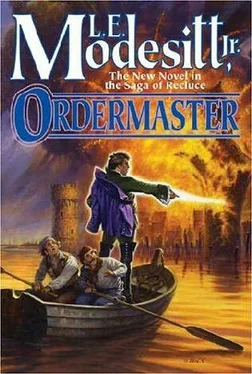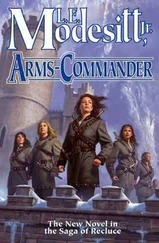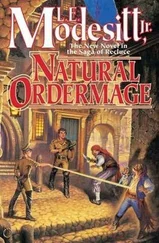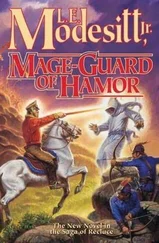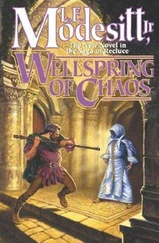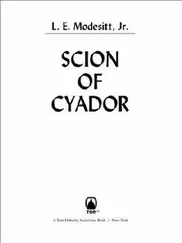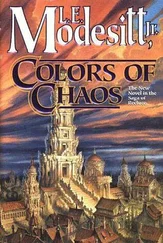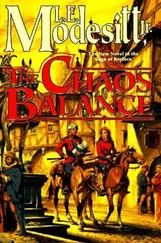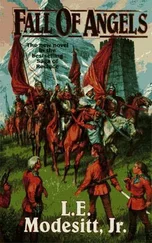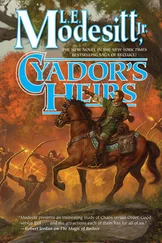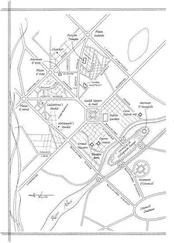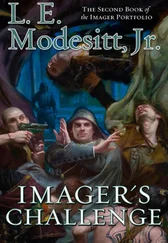L. Modesitt - Ordermaster
Здесь есть возможность читать онлайн «L. Modesitt - Ordermaster» весь текст электронной книги совершенно бесплатно (целиком полную версию без сокращений). В некоторых случаях можно слушать аудио, скачать через торрент в формате fb2 и присутствует краткое содержание. Жанр: Фэнтези, на английском языке. Описание произведения, (предисловие) а так же отзывы посетителей доступны на портале библиотеки ЛибКат.
- Название:Ordermaster
- Автор:
- Жанр:
- Год:неизвестен
- ISBN:нет данных
- Рейтинг книги:4 / 5. Голосов: 1
-
Избранное:Добавить в избранное
- Отзывы:
-
Ваша оценка:
- 80
- 1
- 2
- 3
- 4
- 5
Ordermaster: краткое содержание, описание и аннотация
Предлагаем к чтению аннотацию, описание, краткое содержание или предисловие (зависит от того, что написал сам автор книги «Ordermaster»). Если вы не нашли необходимую информацию о книге — напишите в комментариях, мы постараемся отыскать её.
Ordermaster — читать онлайн бесплатно полную книгу (весь текст) целиком
Ниже представлен текст книги, разбитый по страницам. Система сохранения места последней прочитанной страницы, позволяет с удобством читать онлайн бесплатно книгу «Ordermaster», без необходимости каждый раз заново искать на чём Вы остановились. Поставьте закладку, и сможете в любой момент перейти на страницу, на которой закончили чтение.
Интервал:
Закладка:
“It doesn′t make sense.” Kharl held the beaker, but let it rest on the wide wooden coaster. “Everyone seems to think that battles are glorious-″
“No. A handful of popinjays think so. The wise commanders see them as necessary, and the experienced troops accept them, but as a last resort. Only the minstrels and poets who have not seen the blood and the broken bodies glorify battle. There is little glorious about battle.” Hagen snorted. “The only virtue a battle has is when it puts an end to more battles that otherwise might have to be fought.”
“After all this … if they lose their wizards and their leadership, you think the rebel lords will just surrender … or flee?”
“They’re unlikely to surrender. They might flee.”
“Have you told Lord Ghrant? About our plans?”
“There’s no need to do so, not until the wizards are no longer a problem.”
“You’re still worried about my using magery on Hensolas and Fergyn?”
“I can hope that they will see the writing in the flames they have created.”
“If they don’t?”
“We’ll face that problem when the time comes.”
Kharl could sense that Hagen was disturbed, but that he was not deceiving Kharl. The lord-chancellor was worried. Gravely worried, but it did not seem as though he were worried about what Kharl had done. “You don’t care for the white wizards, do you?”
“The ones used by Hamor? No. The fewer of them, the better for the rest of the world.”
Although the Hagen’s voice was level, Kharl could sense the anger-or cold hatred-behind the words.
“But you worry that Fergyn and Hensolas won’t flee? That they’ll keep fighting?”
“After what happened with Guillam and Malcor and Kenslan … wouldn’t you be worried?” countered Hagen.
“I would.” Kharl had to admit that he could see Hagen’s concerns. But if removing the white wizards and the two lords leading the rebels did not suffice to break the revolt, what would it take? Turning half of Austra into ashes and graves?
“When one deals with passion, ser mage,” Hagen said heavily, “reason is blinded. Care, thoughtfulness, and compassion are forgotten, and the sole thirst is that for blood.”
Kharl looked down at the half-empty crystal beaker.
“I would not see reason blinded by anger,” Hagen went on, “or compassion inundated under a flood of hatred. Yet I fear that already the finer traits have been swept away, and that what you propose may well be necessary-and only the first step. But … first deal with the other white wizard, and then we will see.”
“Then we will see …” Those words echoed in Kharl’s ears long after he had eaten and left the dining room to walk alone through the gardens at the rear of the estate. To the east, the smoke from the dockyards area had subsided, but a haze lay over Valmurl, and the sun shone with a tinge of red in its rays.
XX
On sevenday, wearing the blacks of an order-mage, Kharl had ridden back to the Great House, accompanying the lancers who had been used as the cover for his attack on Alborak. Hagen had left earlier, late on sixday, without telling Kharl.
Kharl had worried about Hagen’s silent departure during his own ride, and even after he’d eaten his midday meal-alone at the Great House-and had returned to his quarters there. Although Hagen had always been his superior, in one way or another, Kharl felt that a distance had grown between them. Was that because Hagen was lord-chancellor? Because as lord-chancellor he had to balance so much? Or because Kharl had changed, because he had become less accommodating and more willing to speak out?
When he had been just a cooper, perhaps the best in Brysta, but only a cooper, people had talked to him. They had been his superiors or his equals or his inferiors, but no one had hesitated to say what they had thought. Even his sons and Charee had spoken. Now …
For a time, the mage who had been a cooper had paced back and forth in his quarters. Then, he opened The Basis of Order and paged through the volume, not exactly certain what he might be looking for, but letting his eyes flow over the words. Before long, a passage stopped him, and he reread it deliberately and slowly.
Magery is no different from any other craft. Each action must be constructed with care, and all the components must be finely finished before being assembled into the final form …
“Magery is no different,” murmured Kharl.
Was that another of his problems? That he had not approached magery as a craft, as he did coopering, where the staves had to be shaped and fitted perfectly, the chimes trimmed exactly, the hoops fitted precisely? No … that was not it exactly. He had tried to do anything involving order and chaos as precisely and as perfectly as he knew how, but he had not seen thepieces, the separate acts, as a part of a whole. Just as a stave was but one part of the barrel, so was one use of magery just a part of the whole framework of order. And he had seen sight shields as separate from hardening air. While the acts were separate, each affected the other.
More important, each act of magery affected the world around him, in ways that he still had great trouble foreseeing. He had had no idea that his public revelation of Guillam’s falseness would immediately set off a revolution. While Kharl had occasionally stretched the truth, or embroidered it, he’d steered away from out-and-out falsehoods his entire life. That had not been because he was that good a person, he felt, but because lying about his craft and what his barrels could and could not do would create more harm than being truthful, even if his honesty and accuracy had occasionally cost him a sale.
Now, he was dealing with rulers and politics, where deception seemed to be accepted, and where so often truth was to be avoided at all costs. Why was that?
Kharl had shied away from that question before, not even wanting to think about it, but his most recent experiences made it clear that it was not a question he could avoid facing. Not any longer. There had to be a reason why truth was avoided.
He paused. Maybe the word itself was the problem, as the one passage in The Basis of Order had suggested.
He shook his head. That might be part of the problem, because what people saw as “truth” varied from individual to individual, but that self-righteousness associated with the word truth also did not explain why lords and rulers said things that were not factually so. Did those who had power come to believe that what they wished to be was already so? Or did they tell lies because they could?
Or was it simply the fact that even a powerful ruler could not make everything work out as everyone wanted, and lies were easier for people to accept than words that were accurate and painful?
Did that mean that, in effect, telling the “truth” created chaos?
Kharl closed the book slowly, turning and looking out the window, out at the darkening clouds rolling in from the west toward Valmurl.
What did “truth” have to do with order? Or power? Or magery?
Kharl already knew that lying made him uncomfortable and probably reduced his power as a mage. Yet those in power, either in Nordla or Austra, used lies to bolster their power. Those in Recluce did not seem to uselies, but all of Hamor was based on chaos and deception, from what he had seen in Swartheld, at least. Were lies a manifestation of chaos? A form of disorder?
That would grant liars and their lies a measure of power.
What of honesty and truth? Or perhaps accuracy and lack of falsehood were better terms. In what aspect of order did their power lie?
Abruptly, Kharl smiled broadly. In its own way, order created chaos. His acts with Guillam had proved that. Order could disrupt chaos. He just had not recognized what had happened.
Читать дальшеИнтервал:
Закладка:
Похожие книги на «Ordermaster»
Представляем Вашему вниманию похожие книги на «Ordermaster» списком для выбора. Мы отобрали схожую по названию и смыслу литературу в надежде предоставить читателям больше вариантов отыскать новые, интересные, ещё непрочитанные произведения.
Обсуждение, отзывы о книге «Ordermaster» и просто собственные мнения читателей. Оставьте ваши комментарии, напишите, что Вы думаете о произведении, его смысле или главных героях. Укажите что конкретно понравилось, а что нет, и почему Вы так считаете.
